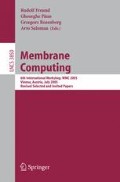Abstract
In the last time several attempts to decrease different complexity parameters (number of membranes, size of rules, number of objects etc.) of universal P systems were done. In this article we consider another parameter which was not investigated yet: the number of rules. We show that 8 rules suffice to recognise any recursively enumerable language if splicing tissue P systems are considered.
Access this chapter
Tax calculation will be finalised at checkout
Purchases are for personal use only
Preview
Unable to display preview. Download preview PDF.
References
Alhazov, A., Freund, R., Oswald, M.: Tissue P systems with antiport rules and small numbers of symbols and cells. In: Proceedings of the ESF Exploratory Workshop on Cellular Computing (Complexity Aspects), Sevilla, Spain, January 31st - February 2nd, pp. 7–22 (2005)
Cocke, J., Minsky, M.: Universality of tag systems with p=2. Journal of the ACM 11, 15–20 (1964)
Hopcroft, J., Motwani, R., Ullman, J.: Introduction to Automata Theory, Languages, and Computation, 2nd edn. Addison-Wesley, Reading (2001)
Minsky, M.: Computations: Finite and Infinite Machines. Prentice Hall, Englewood Cliffts (1967)
Păun, G.: Computing with membranes. Journal of Computer and System Sciences 1, 108–143 (2000); Also TUCS Report No. 208 (1998)
Păun, G., Pazos, J., Pérez-Jiménez, M.J., Rodriguez-Patón, A.: Symport/antiport P Systems with three objects are universal. Fundamenta Informaticae 64, 345–358 (2005)
Păun, G., Rozenberg, G., Salomaa, A.: DNA Computing: New Computing Paradigms. Springer, Berlin (1998)
Păun, G., Sakakibara, Y., Yokomori, T.: P systems on graphs of restricted forms. Publicationes Mathematicae Debrecen 60, 635–660 (2002)
Păun, G., Yokomori, T.: Membrane computing based on splicing. In: Winfree, E., Gifford, D.K. (eds.) DNA Based Computers V. DIMACS Series in Discrete Mathematics and Theoretical Computer Science, vol. 54, pp. 217–232. American Mathematical Society, Providence (1999)
Rozenberg, G., Salomaa, A. (eds.): Handbook of Formal Languages, 3 volumes. Springer, Berlin (1997)
The P systems web page: http://psystems.disco.unimib.it/
Author information
Authors and Affiliations
Editor information
Editors and Affiliations
Rights and permissions
Copyright information
© 2006 Springer-Verlag Berlin Heidelberg
About this paper
Cite this paper
Rogozhin, Y., Verlan, S. (2006). On the Rule Complexity of Universal Tissue P Systems. In: Freund, R., Păun, G., Rozenberg, G., Salomaa, A. (eds) Membrane Computing. WMC 2005. Lecture Notes in Computer Science, vol 3850. Springer, Berlin, Heidelberg. https://doi.org/10.1007/11603047_24
Download citation
DOI: https://doi.org/10.1007/11603047_24
Publisher Name: Springer, Berlin, Heidelberg
Print ISBN: 978-3-540-30948-2
Online ISBN: 978-3-540-32340-2
eBook Packages: Computer ScienceComputer Science (R0)

